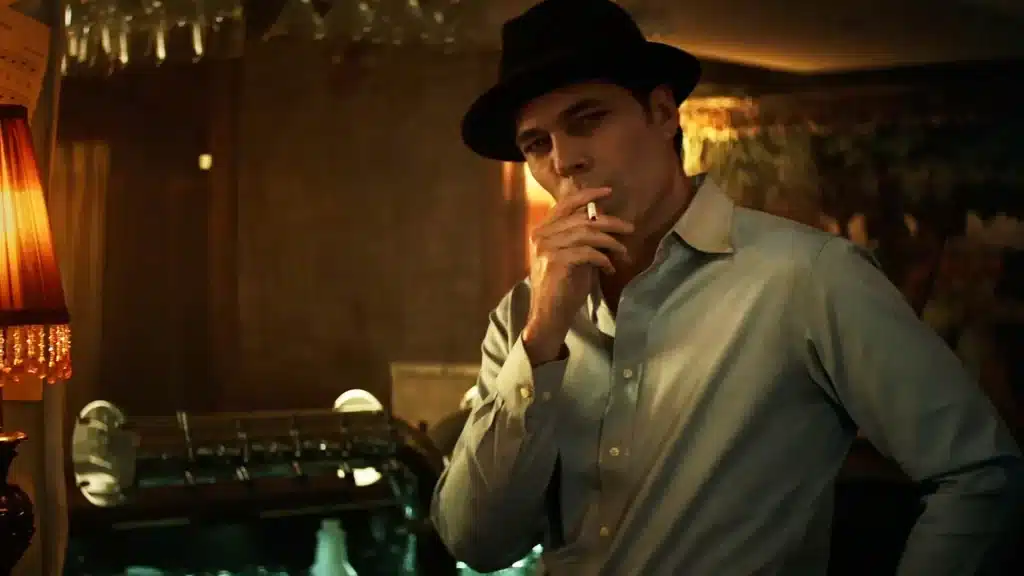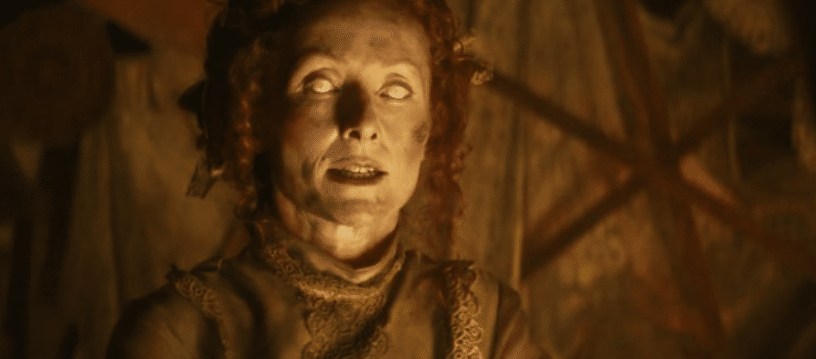
Welcome to Purgatory.
In the tradition of updating the afterlife mythos – from Beetlejuice to The Lovely Bones – directors and writers the Butler Brothers have turned their hand to the ultimate hinterland in Purgatory Jack (2023), taking for a setting the place where souls wait to be cleansed of residual sin before getting into heaven. And they’ve done some interesting work with it; The Divine Comedy this ain’t, and instead their version of Purgatory is weirdly recognisable, a little ramshackle and in many ways, original and bizarre. This all unfolds to us with some early bridging shots, getting us from Earth to afterlife – firstly with a photo of what looks like a couple’s suicide pact, some time in the mid-twentieth century. This is what does for Jack: we see him, still wearing clothes in the style of his time on Earth, hiding away, alone, in a bar-cum-residence which is filled with clocks (to remind him that time is still passing, even if it doesn’t pass the same way where he is). We also see some paramedics desperately working on a young woman; it’s left to us to work out whether their efforts are successful, because the first time we get a good look at her, she’s materialising in a strange place, watched by a group of young women – one of whom is clutching a severed arm.
Okay. In short order, we also find out that Purgatory runs by certain rules. Blood – which turns to ashes if a person spends a long time there – is treated like a drug by older souls, which is of great peril to new arrivals, particularly if there’s still a question mark over whether they’re dead or alive, in a hinterland of their own. That seems to be the case with punk musician Viv Vacious (Alexandra Beaton), who is famous enough that the three muses sitting on the bench nearby are instantly starstruck. We also glean that body parts are interchangeable here, thanks to a black market in hacked-off limbs. Put people anywhere, living or dead, and it seems they’ll create some sort of godawful underground economy before too long. In any case, Viv is at risk and one of her fangirls tells her she needs to lay low, get off the streets: to help her to do just that, she is taken to Jack’s residence, and he’s able to fill her in on a few more relevant pieces of information.
They talk – or rather, Jack talks, Viv Vacious snarls and huffs (there are some issues with this character, who blows hot and cold at points, reverting to shouty feminist platitudes which are probably intended to make her relatable as an alt-rock pioneer, but can wind up keeping her at arm’s length). It turns out that Viv’s own mother committed suicide some twenty Earth years previously; Jack doesn’t really help himself here by pointing out that Purgatory is filled with suicides – maybe her mom is here, too. On hearing this, Viv quickly decides that she has to seek her out, talk to her one last time about what led her to leave a seven year old child behind. As a result, Jack decides he has to go along too as a kind of penance, perhaps, prompting an odyssey of sorts – which puts them both in danger, but also reveals a lot more about the machinations going on behind the scenes, and how the worlds of the living and the dead overlap.
How to define this film, in genre terms? Cyberpunk neo noir perhaps? There are definitely noir elements here, and not just because of Jack’s outfit: a flawed main character, the search for a covert truth, the use of flashback…but then, the majority of noirs weren’t hinged around ideas such as organised bloodletting and underground surgery, so the label won’t do on its own. Maybe that’s just fine. You really can’t fault the range of ideas initially at play here: the film is often funny, often thoughtful and occasionally profound. Microbudget or not, the film gets a lot out of its resources: it uses visual clues and touches to add to the strangeness; it lights and frames all of the interior shots very well, and also manages to make outside locations look suitably strange – all through relatively simple devices like the use of post-production cartoon panel colours, and/or framing things so that the place looks like the savage wasteland it should be. To come back to the idea of influences, it reminded me in places of the Clive Barker novella Mister B. Gone, which depicts hell as just a place where demons live, shop, socialise, cook, and live out almost humdrum lives, just in an extraordinary place.
The main issue with Purgatory Jack is that, after establishing an intriguing, creative take on its selected setting, it doesn’t quite have enough other surprises to carry it through an hour and forty minutes which, although by far not the longest runtime ever seen in an indie film, is long enough to need a solid narrative arc with a few questions and resolutions. Really speaking, the idea here is very simple, so once the initial impression made by this particular take on Purgatory settles, you’re left with quite a long wander through the landscape while the main characters look for someone, which can feel like it’s lagging in places. Yes, we do get some resolutions, but these are guessable to a point (alongside some other plot points which raise a few issues but don’t linger over those particulars, which can make things feel uneven by the end.) But nonetheless, the Butler Brothers’ dark humour, so prevalent in Unfriending (2023), is still here in enough measure to land with audiences, showing them to be filmmakers with plenty of ideas and promise, and happy to take on the big ideas along the way, even life and death.
